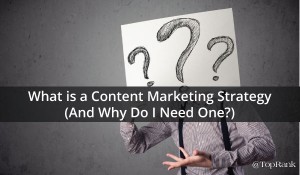With traditional marketing tactics becoming less effective as the Internet breeds more self-guided buyers, content marketing has risen up to provide marketers with another way to engage with their target audience.
Rather than pushing out a one-size-fits-all message, content marketing allows you to give your audience tailored, relevant and meaningful information. It helps you build a trusting relationship with your audience–often times before they even become a customer.
But just because you do content marketing, doesn't mean you're doing it effectively. According to the Content Marketing Institute and MarketingProfs annual research report, 55% of marketers said they didn't know what content marketing success or effectiveness looked like. This is where a content marketing strategy can help you define a path to successful content creation.
But what is a content marketing strategy?
What is a Content Marketing Strategy?
A content marketing strategy provides you with answers to the why, who and how a content marketing program can achieve your business objectives. It's your infrastructure. Your game plan. Your roadmap. It's how you plan to help your customers solve their pain points through content marketing.
For example, your content marketing strategy will likely include some very important details about your customers, what you hope to accomplish with content marketing and how you plan on getting there. A successful content marketing strategy will be thoroughly integrated with your other digital marketing initiatives to create a cohesive experience for your customers across platforms.
Why Do I Need a Content Marketing Strategy?
Without a content marketing strategy, you're throwing content into the world and hoping it sticks somewhere. With a strategy in place, you're able to plan, produce, promote and measure the effectiveness of your content, and use that information to propel your efforts forward.
In order for you to measure the effectiveness of your program, your content marketing strategy needs to be documented. In the same annual report mentioned above, marketers with a documented content marketing strategy said they got better results from the content marketing tactics, social platforms and paid methods of content distribution that they used.
7 Elements to Include in Your Content Marketing Strategy
#1 – Goals & Objectives
The idea behind creating and implementing a content marketing strategy–and really any business strategy–is to achieve specific goals and objectives. Some of the most common goals include increasing website traffic, growing social audiences, and increasing contact form submissions or newsletter signups. We suggest making these goals smart goals–something that can be tracked and measured. For example, rather than your goal being to increase website traffic, your smart goal could be increasing organic website traffic by 15% year-over-year.
#2 – Audience Segmentation & Characteristics
This is where you need to get into the minds of your target audience. Understanding their motivations, their pain points and what they're searching for will be key to building out your strategy. Keyword research and your own site's analytics are good places to start. In addition, your sales teams can provide you with incredible customer insights.
#3 – Brand Messaging
As mentioned above, your content marketing strategy should help you tell your brand's story. What message do you want to communicate to your audience? What sets you apart from your competition?
#4 – Multi-Channel Touch Points
Today's customer journey involves multiple touch points on multiple channels (social media, search, digital ads, news posts, customer review sites, etc.). Define which channels you'll use and how you'll use them to reach your audience, and what your specific objectives for each channel are.
#5 – Content Types
From blogs and infographics to podcasts and videos, outline which content types and tactics you plan to use. To do this, consider what types will be most effective with your audience and how they will work together to reach your objectives. Again, leverage your sales teams. Their insights can help you choose your content and map it to specific stages (attract, engage or convert) in the buying cycle.
#6 – Content Topics
Content marketing is all about providing the best answer to your audience, when and where they are searching for them. Use your customer insight and their pain points to guide some of your content topics. In addition, check out the current content landscape by performing some of your own searches for your top keywords and studying the top SERPs that are returned. What do those pages offer the user? What opportunities do you see for your own content?
#7 – Measurement
Your plan should include details on how you plan to measure the effectiveness of your content and the channels you use to promote it. This will allow you to know if you're hitting your stated objectives so you can tweak your strategy moving forward.
Content Marketing Strategy Resources
If you're hungry for more information on content marketing strategy, here are a few articles that you may find helpful:
- What's the Secret of the Most Powerful Content Marketing Strategy? Simplicity
- How to Pick the Best Content Marketing Tools for your 2016 Content Marketing Strategy
- Michael Brenner's Tips, Tools & Templates to Build Your Content Marketing Strategy
What steps do you take to better understand your audience and inform your content marketing strategy? Tell us in the comments section below.
Header image via Shutterstock
Gain a competitive advantage by subscribing to the
TopRank® Online Marketing Newsletter.
© Online Marketing Blog - TopRank®, 2016. |
What is a Content Marketing Strategy (And Why Do I Need One?) | http://www.toprankblog.com
The post What is a Content Marketing Strategy (And Why Do I Need One?) appeared first on Online Marketing Blog - TopRank®.

No comments:
Post a Comment